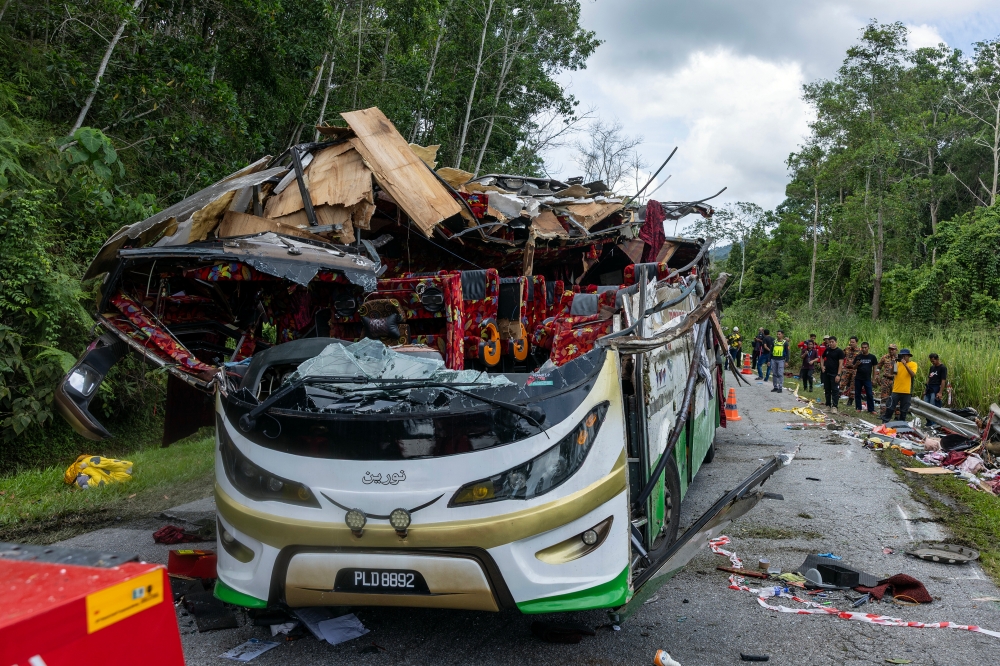JUNE 11 — Fifteen students. Dead. Their bodies carted off the East West Highway in the dead of night. Their only mistake? Boarding a bus in a country where enforcement is ornamental and task forces bloom like weeds after a tragedy.
Apparently the driver had 18 traffic summonses, most for speeding. The bus itself had 21 summonses, yet both remained in operation, filled with students and sanctioned by silence.
Malaysia doesn’t prevent disasters, it holds press conferences afterwards.
We’ve done this before. Genting in 2013. Pagoh in 2016. Gerik in 2025. And just last month on May 13, nine FRU officers were killed when a lorry ploughed into their convoy on the North–South Expressway near Teluk Intan. One month. Twenty-four lives lost in two high-profile crashes. And still, we behave as though this is normal.
Since the turn of the century, thousands of Malaysians have died in fatal bus and lorry crashes, many in incidents with double-digit body counts.
In just the past six years alone, lorries have claimed 1,457 lives, one death every 36 hours. These aren’t accidents. They’re predictable outcomes of predictable failures.
We have the agencies—JPJ, MIROS, APAD, and an alphabet soup of policies, audits, demerit points and “Ops” campaigns.
Yet vehicles with dozens of summonses keep operating. Trucks with faulty brakes barrel down highways. Reckless drivers with paper trails of misconduct still hold licenses. Because enforcement is episodic.
Culture is constant.
And our road culture, especially among commercial operators, is one of engineered neglect. Reckless drivers aren’t removed. They’re rotated. Operators aren’t held accountable. We fine them, feign shock, mourn the dead, and then fund the next round of silence.
So here’s what might actually change something:

1. Make MPs ride what we die in.
Mandatory use of public transport, public hospitals, and national schools, for themselves and their families, not as guests, but as users. Let them queue and face the traffic. Let them wait at the Klinik Kesihatan. Let them feel what they legislate. Policy shifts when privilege is interrupted.
2. Kill the summons culture.
Five serious offenses by a commercial driver? Their vocational license is suspended. Vehicles with unpaid summonses? No road tax, no insurance, no renewal, until cleared. Let automation enforce what weak willpower won’t.
3. Criminalise corporate negligence.
Operators with recurring fatalities should face criminal investigation, not just the drivers, but the directors. If they profit from risk, let them pay for loss.
4. Mandate tamper-proof GPS and telematics.
Every commercial vehicle. Speed, hours, braking systems, tracked in real time and fed to enforcement dashboards. No data, no road access.
5. Publish a national blacklist of repeat-offender operators.
A public database naming transport companies with persistent violations. No hiding behind shell entities. Let schools, agencies, and the public choose lives over contracts.
Because what we have now is a theatre of prevention. We mourn in high-definition but legislate in low resolution. We let policies die of paperwork while people die on roads.
These students didn’t die in an accident. They died in a system that knew better, and did nothing.
Until those responsible feel the consequences, until pain is institutionalised alongside policy, we’ll bury more futures.
One crash at a time.
* This is the personal opinion of the columnist.






















